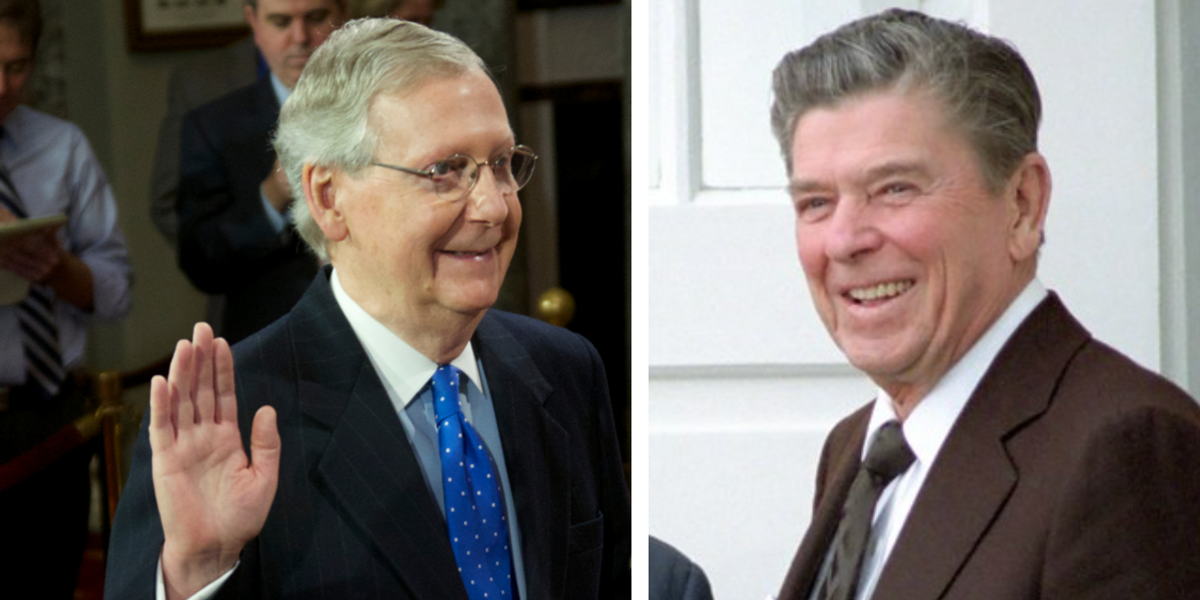The Associated Press reported Wednesday that Mitch McConnell would be stepping down in November as Republican Senate Minority leader.
Two points in the reports were highly irritating as they peddle common misrepresentations in mainstream journalism of Ronald Reagan and his legacy, particularly on foreign policy.
AP’s Michael Tackett wrote, “(McConnell’s) decision punctuates a powerful ideological transition underway in the Republican Party, from Ronald Reagan’s brand of traditional conservatism and strong international alliances, to the fiery, often isolationist populism of former President Donald Trump.”
He’s establishing that there are two sides on the Right regarding foreign policy: The “strong international alliances” of Reagan and McConnell, and the “isolationist populism” of Trump.
No space in between.
The AP re-upped this view again later in the report: “McConnell endorsed Reagan’s view of America’s role in the world and the senator has persisted in face of opposition, including from Trump, that Congress should include a foreign assistance package that includes $60 billion for Ukraine.”
How simple.
Let’s talk about “Reagan’s view of America’s role in the world.”
Since at least the 1990s, neoconservatives have tried to claim Reagan’s legacy as being indistinctive from their own world view when it simply is not true, however much mainstream outlets simply accept their narrative.
There’s more than mere nuance or even contrast. There are areas — big ones — where Reagan and the neocons are exactly opposite.
Bill Kristol and Robert Kagan’s 1996 essay, "Toward a Neo-Reaganite Foreign Policy," targeted the “neoisolationism of Patrick Buchanan” and even “some version of the conservative ‘realism’ of Henry Kissinger and his disciples.”
For Kristol and Kagan, even realism wasn’t realistic.
The neocon duo wrote of the 40th president: “Reagan called for an end to complacency in the face of the Soviet threat, large increases in defense spending, resistance to communist advances in the Third World, and greater moral clarity and purpose in U.S. foreign policy.”
They are correct to imply that how Reagan handled the Soviets is a great and admirable legacy.
But how Reagan went about it, on the most significant part anyway, made him a pariah to the neoconservatives and Republican hawks of his day. How Reagan handled it was not like McConnell likely would have either, based on the senator’s Ukraine positions alone.
Let’s review.
Newt Gingrich called Reagan’s 1985 meeting with Soviet President Mikhail Gorbachev “the most dangerous summit for the West since Adolf Hitler met with Neville Chamberlain in 1938 in Munich.” Obviously hawks haven’t developed any new material since.
In 1985, a conservative lobbying group ran a full page ad in U.S. newspapers comparing Reagan with Neville Chamberlain and Gorbachev with Adolph Hitler. The Munich gimmick was as tired then as it is today — and in retrospect, so laughably wrong.
Gingrich would also go on to say, “Measured against the scale and momentum of the Soviet empire’s challenge, the Reagan administration has failed, is failing, and without a dramatic change in strategy will continue to fail. . . . President Reagan is clearly failing.”
Today, most Americans — and especially most conservatives — see Reagan’s negotiations with the Soviets as an historic success that also avoided war.
Long before Reagan’s negotiations with Gorbachev, in 1982 Norman Podhoretz was complaining about “The Neo-Conservative Anguish Over Reagan’s Foreign Policy.” As Jim Antle noted at The National Interest, four years later Podhoretz “would accuse Reagan of having ‘shamed himself and the country’ with his ‘craven eagerness’ to give away America’s nuclear advantage.”
Shameful, that Reagan. Luckily, America survived. As seen with Ukraine today, hawks are often resistant to talks or negotiations because they might lead to peace, which is seemingly not their goal, something they are increasingly saying out loud.
McConnell wants to give Ukraine billions more of U.S. dollars that will inevitably prolong their conflict with Russia. He’s not pushing for Ukraine’s president to sit down with Russia’s no matter how dismal conditions there become. McConnell has been critical of Donald Trump’s occasional warmness to Putin, presumably a precursor to him possibly talking with Russia’s president, something Trump openly says he will do.
Besides Reagan’s willingness to talk to America’s enemies, he didn't want U.S. soldiers to be sitting ducks abroad needlessly. As American troops continue to be targeted today in places like Jordan, Iraq, and Syria, many Americans wonder why they were even there to begin with.
When a Marines barrack was attacked in Lebanon in 1982, taking 241 lives, Reagan immediately withdrew troops — what hawks today or at any other time might call “cut and run.”
Former American Conservative Union President head David Keene once said, “Reagan resorted to military force far less often than many of those who came before him or who have since occupied the Oval Office… After the [1983] assault on the Marine barracks in Lebanon, it was questioning the wisdom of U.S. involvement that led Reagan to withdraw our troops rather than dig in. He found no good strategic reason to give our regional enemies inviting U.S. targets.”
“Can one imagine one of today’s neoconservative absolutists backing away from any fight anywhere?” Keene asked.
No. I can’t. Not a single one. Certainly not McConnell. And yet neoconservatives continue to claim Reagan wholesale and the mainstream press regurgitates this myth each chance they get.
Antle wrote in 2014, “Many conservatives today reduce Reagan to comments like 'evil empire', 'tear down this wall', or 'we win they, lose' as well as policies like the defense buildup, Star Wars and Pershing missiles.”
“While all of those things, in addition to Reagan’s moral clarity about communism, were important, they are not the whole story — as contemporary criticism of Reagan makes clear at the time,” he added.
- Beware the 'America First' foreign policy phonies ›
- Maybe It's Time To Say 'OK Boomer' To Our Foreign Policy ›














